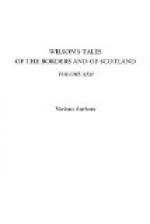One day, seeing two or three natives, amongst whom was a woman with a young infant on her back, passing within a short distance of the house, not approaching it—for he was now so much dreaded by these poor creatures that few came to the door—my master, as usual, ran in for his rifle, and calling his dogs around him, gave chase to the party.
The men being unencumbered, fled on seeing him, and being remarkably swift of foot, were soon out of his reach. Not so the poor woman with the child on her back: she could not escape; and at her the savage ruffian fired, killing both her and the infant with the same murderous shot.
This double murder was of so unprovoked, so cold-blooded, and atrocious a nature, that it is probable, little as the life of a native was accounted in those days, that my master would have been called upon to answer for his crime before the tribunals of the colony; but retribution overtook him by another and a speedier course.
On the following day my master came out of the house, about ten o’clock in the forenoon, with an axe in one hand, and the fatal rifle, his constant companion, with which he had perpetrated the atrocious deed on the preceding day, in the other, and coming up to me, told me that he was going to a certain spot in an adjoining wood to cut some timber for paling, and that he desired I should come to him two hours after with one of the cars or sledges in use on the farm, to carry home the cut wood. Having said this, he went off, little dreaming of the fate that awaited him.
At the time appointed I went with a horse and sledge to the wood, but was much surprised to find that my master was not at the spot where he said he would be;—a surprise which was not a little increased by perceiving, from two or three felled sticks that lay around, that he had been there, but had done little—so little, that he could not have been occupied, as I calculated, for more than a quarter of an hour. Thinking, however, that wherever he had gone he would speedily return, I sat down to await him; but he came not. An entire hour elapsed, and still he did not make his appearance. Beginning now to suspect that some accident had happened him, I hurried home to inquire if they had seen or heard anything of him there. They had not. His family became much alarmed for his safety—a feeling in which my conscience forbids me to say that I participated.
Two of my fellow-servants now accompanied me back to the wood, which it was proposed we should search. This, so soon as we had reached the spot where my master had appointed to meet me, and where, as already mentioned, he had evidently been, we began to do, whooping and hallooing at the same time to attract his attention should he be anywhere within hearing.
For a long while our searching and shouting were vain. At length one of my companions, who had entered a tangled patch of underwood which we had not before thought of looking, suddenly uttered a cry of horror. We ran up to him, and found him gazing on the dead body of our master, who lay on his face, transfixed by a native spear, which still stood upright in his back. It was one of those spears which the aborigines of New South Wales use, on occasion, as missiles, and which they throw with an astonishing force and precision.




